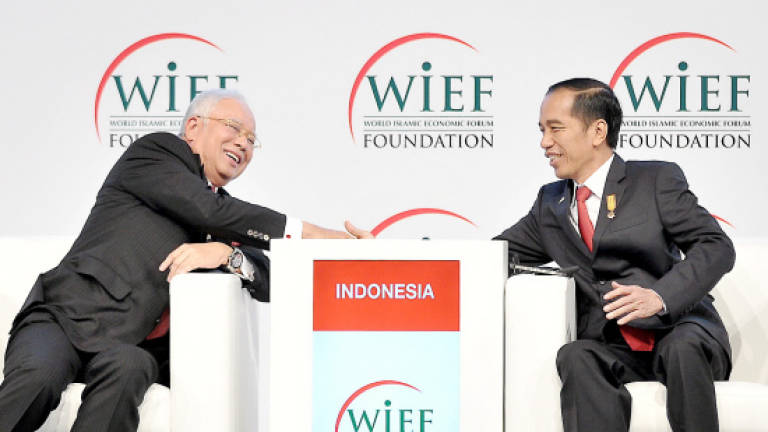Malaysia, Indonesia yes to more comprehensive trade, investment collaborations

JAKARTA: Prime Minister Datuk Seri Najib Abdul Razak's presence at the just-concluded back-to-back meetings with Indonesian President Joko Widodo, as well as other heads of state here, is timely in view of the excellent progress in bilateral relations and current developments in the region and the global fora.
The discussions between both Najib and Widodo, fondly known as Jokowi, would definitely further strengthen Malaysia's and Indonesia's commitments towards a more comprehensive collaborations in trade and investment.
Thus, it is equally important for Malaysia and Indonesia not to let any petty issues raised by certain quarters to sour ties between them but instead further work to strengthen the already-closed bilateral ties.
It is clear that relations between the two nations are unique and vital as the people of both countries are like one big family who share the same history, border, language and culture.
And these similarities should be an important factor to strengthen unity and cooperation between both countries.
Both countries shared the view that bilateral ties should be nurtured, encouraged and made more relevant in tandem with the local and international environment.
To this end, during the 11th Malaysia-Indonesia Annual Consultation, both leaders welcomed the outcome of the 14th Meeting of the Joint Commission for Bilateral Cooperation (JCBC), which was held in Kuala Lumpur in October 2015.
The JCBC has been an effective mechanism to review the state of bilateral relations and further explore new potential areas of cooperation for the continued welfare of the people of both countries.
"Both leaders underscored the commitment to further strengthen bilateral relations and cooperation, as well as to intensify efforts in addressing the challenges in the region," said Najib, who is also Finance Minister, in a joint statement released after the annual consultation.
He said relevant officials had been tasked to further seek ways and means to achieve the bilateral trade target of US$30 billion (RM121 billion) soon.
Malaysia and Indonesia had set a bilateral target of advancing trade to as much as US$30 billion by 2015, but it could not be reached due the unfavourable economic scenario.
In terms of trade, Indonesia is Malaysia's seventh largest trading partner and the third largest country among Asean members, with total bilateral trade of RM60.16 billion in 2015.
Both leaders have also encouraged the Indonesia-Malaysia Business Council to continue its active contribution in identifying and enhancing investment in new potential sectors.
Meanwhile, recognising the enormous potentials of the global halal trade and industry and opportunities it could bring to the private sectors, Indonesia took note of Malaysia's proposal on the basis of reciprocity to simplify the halal certification process between the two countries.
On palm oil, the leaders hailed the strengthening of cooperation among palm oil-growing countries.
They encouraged the Council of Palm Oil Producing Countries secretariat here to plan and implement comprehensive programmes to promote the image of palm oil globally.
The two countries also witnessed the signing of a bilateral agreement between Bank Negara Malaysia and the Financial Services Authority of Indonesia under the Asean Banking Integration Framework.
Through this agreement, Najib hoped the financial services between the two countries would grow in a more efficient and systematic manner.
On investment, Najib thanked the Indonesian government for the opportunities given to Malaysian government-linked companies (GLCs) to participate in the republic's infrastructure projects.
He said Jokowi was confident in the GLCs' abilities to shoulder their tasks in terms of building infrastructure projects.
Hence, Najib said, there was a possibility that Malaysian companies could be considered for other projects in Indonesia soon.
He cited the Cikopo-Palimanan Toll Highway by PLUS Expressways International Bhd, which was opened by Jokowi recently, as one of them.
This was further attested to with the signing of a memorandum of understanding by Sime Darby Bhd, I&P Group Sdn Bhd and SP Setia (Indonesia) Sdn Bhd with PT Hanson International Tbk to jointly develop an affordable housing project, comprising 40,000 units, with a gross development value of RM3.5 billion.
"These are among the examples of Malaysia's contributions to the infrastructure development of Indonesia which is the main agenda under Jokowi's leadership and it was given to us based on good relations between the two countries", said Najib.
Najib said besides issues on economic cooperation, other matters being discussed in the consultation included Indonesian workers, maritime, trans-boundary haze pollution.
Another was to settle the issue of Sulawesi Sea waters completely as it had been deferred for too long, he said.
Both leaders also took this valuable meeting opportunity to exchange views on regional and global issues, paying particular attention to the Asean Community 2015 and the work towards Asean Vision 2025.
They exchanged views on, among others, the increasing of security challenges and threats in the region, South China Sea, radicalisation and other global issues.
The prime minister was in Jakarta to attend the 11th Malaysia-Indonesia Annual Consultation in Aug 1, followed by the three-day 12th World Islamic Economic Forum from 2-4 Aug, 2016.
Meanwhile, the next 12th Annual Consultation will be held in Malaysia next year, at at date to be mutually-agreed upon and communicated through diplomatic channels. — Bernama